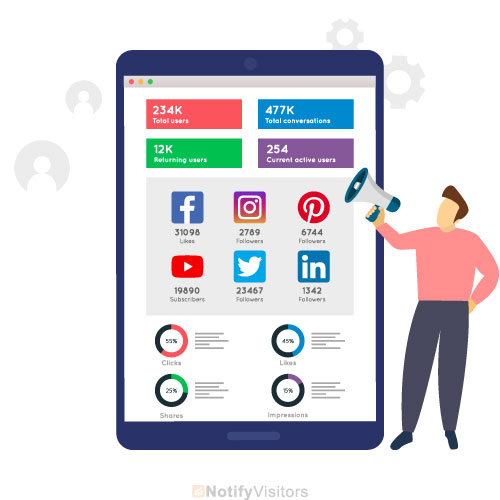Having a good brand reputation can certainly influence a consumer’s decision to purchase a product. This is why most brands and businesses today focus on building a positive brand image. Since the majority of your audience is looking online to learn about brands, it is prudent to direct your brand reputation efforts towards online review sites and social media.
This blog tells you more about brand reputation and how using marketing automation tools and strategies can help regularly monitor and maintain your brand reputation online.
Contents
What is brand reputation?

Brand reputation refers to how consumers, stakeholders, and the market as a whole perceive a brand. It is the rounding up of emotions and ideas that people associate a brand with. It is brought about by the sum of experiences about a brand which may come from in-store exposures, customer service experiences, online encounters, purchase events, after-sales services, and more.
A favorable brand reputation means that the consumer trusts the brand and its offerings and is happy, confident, and proud about buying from it. Branding agencies can help you create a positive brand reputation.
Why is brand reputation important?
A brand’s online presence and online customer experiences contribute a lot to brand reputation. Although this has made it convenient for shoppers to make purchasing decisions and purchases, it has also ushered the need for brands to be precautious in maintaining a positive brand reputation.
Here are some brand reputation statistics that help emphasize the importance of brand reputation management.
- 78% of consumers trust online reviews, provided they seem genuine.
- 71% of social media users are likely to recommend a brand with which they had a positive experience.
- 68% of consumers are influenced to buy when they see positive reviews, and 40% are discouraged from purchasing when they see negative reviews.
- Only 14% of your prospects do not go through your brand’s online reviews
- Most customers look for at least three stars to buy from you
- 89% of prospects inspect how you respond to a review about your brand.
All these make it important for brands to include reputation management as a vital part of their marketing strategies.
What are the benefits of brand reputation management?
When a brand takes proper and persistent efforts towards managing its reputation, it’ll enjoy the following benefits.
- Increased brand awareness
- Established trust and credibility in the market
- Boosted sales
- Reduced risk
- Competitive Advantage
- Positive brand image
- Gain valuable business insights that improve results
- Customer Loyalty
- Increased Profits
- Boost brand value
- Increase customer loyalty
- Word of mouth promotion
- Business expansion
- Customer retention
- Employee retention
So, if your direct your effort towards brand reputation management, you’ll enjoy the above-listed benefits and more.
How can marketing automation help maintain your brand reputation?
To succeed in today’s competitive business place, you need to maintain your brand reputation. One essential area where you need to establish, monitor, and work on your brand reputation is social media. However, doing it manually is time-consuming, tedious, and error-prone. This is where marketing automation software can help.
Marketing automation involves using software to automate repetitive marketing tasks. Businesses and their marketers can employ this tool to manage their online reputation, nurture leads, personalize and manage campaigns, and integrate information between marketing and sales.
Marketing automation software can help you in this regard in the following ways.
- Post your compelling brand promotional messages regularly on social media.
- Track social mentions. The tool will alert you of your brand mentions on social media. You can immediately respond with a “thank you” message for positive comments and take steps to resolve complaints and grievances mentioned in negative comments.
- Identify consumers who spend more time on your site and promote your offerings to them.
- Keep track of particular users and integrate your marketing efforts toward them.
- Connect with customers and solve difficulties they are facing- at times even before they occur.
- Keep abreast of current digital marketing trends.
How to manage brand reputation with marketing automation?
To automate your brand reputation management, you need brand reputation management software. It will significantly lower your workload, and thus, bring in better results. Today, numerous good online reputation management reseller are available in the market.. You can use one of these to manage your brand’s reputation.
A reliable software should have features for tracking brand mentions over social media, have sentiment analyzing capabilities, facilitate sending real-time notifications, integrate with other software that you are using, have an open and composable architecture, and possess reporting and analytic capabilities, sometimes even as data visualization.
Let’s discuss how you can automate your brand reputation using this software in a step by step manner-
1. Monitor your organization’s online presence

News travels at lightning speed online. So, you need to know in real-time what people are talking about your brand. So, the first step in brand reputation management is brand monitoring. You need to monitor your online mentions so that you can react and respond to them.
This tool has features to detect your brand mentions online in real-time on social media platforms and review sites. These also facilitate sentiment analysis and analytics. Sentiment analysis means going through a lot of comments and culminating in an understanding of what people are feeling about your brand.
When it comes to analytics, the tool measures the outcomes of your marketing campaign and your social media reach (how many people could have viewed your social media post). This way, you’ll get to know the performance of your brand in the market and optimize future campaigns to ensure more efficiency.
Composable CDPs take social media monitoring a step further by analyzing customer sentiment and identifying key influencers. This allows you to tailor your outreach strategies and engage with your audience in a more meaningful way, further enhancing your brand reputation.
2. Monitor online review sites
These days, people trust online reviews more than regular ads. This is because they look for genuine, authentic, and unfiltered opinions and reviews from real users based on their brand experience. Stats says that 91% of 18-34 old consumers trust these reviews just as they would trust personal recommendations from friends, colleagues, and family members. So, online reviews are crucial for your brand reputation.
With your brand reputation management tool, you can monitor reviews posted about your brand at various review sites. This in turn will facilitate-
- Addressing and resolving customer complaints immediately.
- Upgrading your products and services as per customer needs. You’ll also get to determine which feature development should be prioritized.
- Admitting and apologizing for your mistakes will show your brand in a favorable light. Thus, you can gain a good reputation even from bad reviews.
- Adding a human touch will let people understand that you really care.
- Monitoring and responding to reviews posted online immediately can also boost customer satisfaction. This will encourage customers to stay with your brand long-term. Thus, it increases their chances of being loyal to your brand.
- This will also ensure excellent customer service.
3. Monitor your competitors’ efforts
A product identical to yours could be described using more effective words and different ideas on various networks. Your product could have more and better audiences on sites that you aren’t yet into. One ideal way to discover these is by monitoring your competitor’s efforts.
Monitoring the campaigns of competitors who are more successful than you using social listening tools will reveal valuable info such as which platforms are the most accessible and efficient, how well your competitor is performing on social networks, and which hashtags are the most welcomed in your niche.
You’ll also get to identify their weaknesses by reading their negative reviews. This will help you avoid making these mistakes yourself. Further, by tracking their moves, comparing your outcomes against them, and altering your marketing, sales, and messaging to the current trends, you’ll gain a competitive edge.
4. Community engagement
Your audience wants your brand to communicate with them through social media. They seek communication in terms of product queries, appreciating your product, and receiving customer support. They also feel important as a customer when your brand interacts with them over social media.
Brand reputation management tools also help you create an engaged social media community by posting on social media. This helps you go viral if you post something very interesting or offer something world-class.
Social media posting also creates brand awareness. People get acquainted with what you offer, what your values are, how your logo looks, how your brand communicates with them, and more. Such recognition of your brand can boost your reputation among consumers and build relationships with customers.
5. Content marketing and SEO

Another crucial aspect of brand reputation management is content marketing. Your content should focus on ways to solve your customers’ pain points. You need to educate your customers instead of directly selling to them. This will help your content get popular and establish you as an authority in your niche. And this in turn will easily widen your brand’s presence and reach.
This is where SEO becomes indispensable. When your website is positioned well, it will organically rank higher for the keywords in your area. And this will drive organic web traffic and boost your brand positioning further.
Conclusion
Brand reputation management is indispensable for growing your business. With a favorable brand reputation, people tend to trust, be assured of, and become loyal to your brand. All these have a positive impact on your bottom line. Brand reputation in this era largely relates to the online reputation of your brand. For, people discuss the positive and negative experiences about your brand on social media sites and online review sites.
However, manually monitoring and managing your online brand mentions is extremely tiresome and error-prone. This is why you need to adopt marketing automation for managing your brand reputation. It’ll simplify the tasks and help uplift your brand. So, once more go through the steps I’ve mentioned in this blog to execute your online brand reputation management to deeply understand what you need to do.

























 Email
Email SMS
SMS Whatsapp
Whatsapp Web Push
Web Push App Push
App Push Popups
Popups Channel A/B Testing
Channel A/B Testing  Control groups Analysis
Control groups Analysis Frequency Capping
Frequency Capping Funnel Analysis
Funnel Analysis Cohort Analysis
Cohort Analysis RFM Analysis
RFM Analysis Signup Forms
Signup Forms Surveys
Surveys NPS
NPS Landing pages personalization
Landing pages personalization  Website A/B Testing
Website A/B Testing  PWA/TWA
PWA/TWA Heatmaps
Heatmaps Session Recording
Session Recording Wix
Wix Shopify
Shopify Magento
Magento Woocommerce
Woocommerce eCommerce D2C
eCommerce D2C  Mutual Funds
Mutual Funds Insurance
Insurance Lending
Lending  Recipes
Recipes  Product Updates
Product Updates App Marketplace
App Marketplace Academy
Academy

